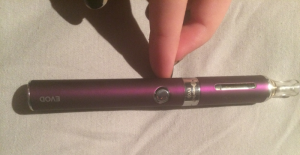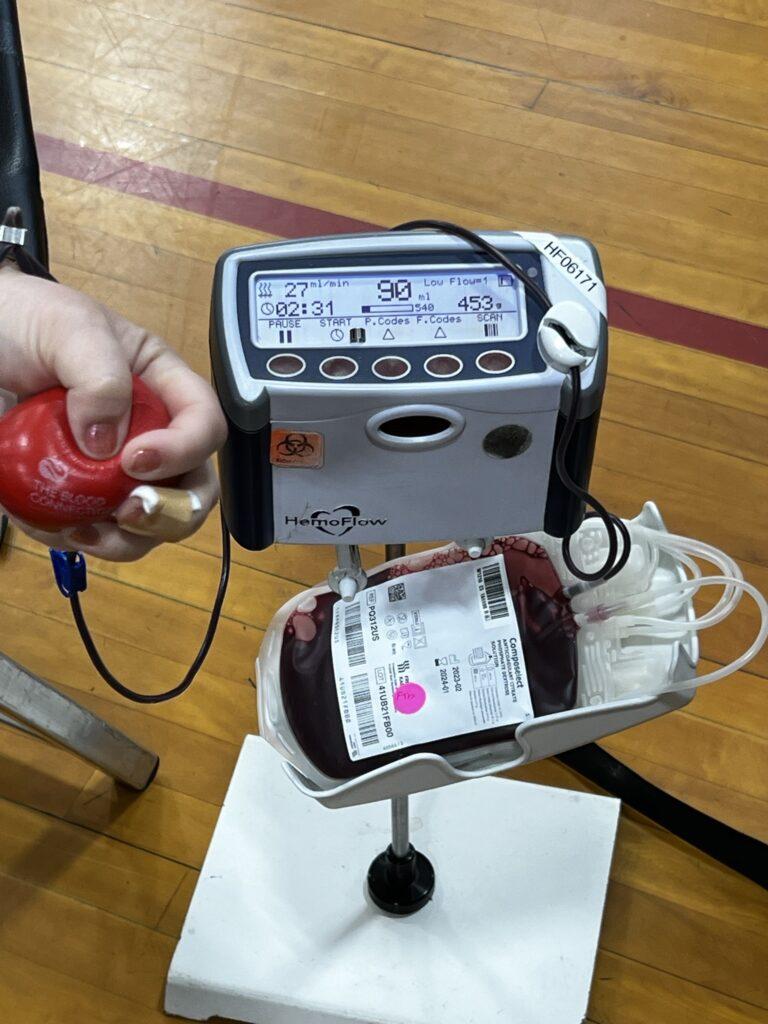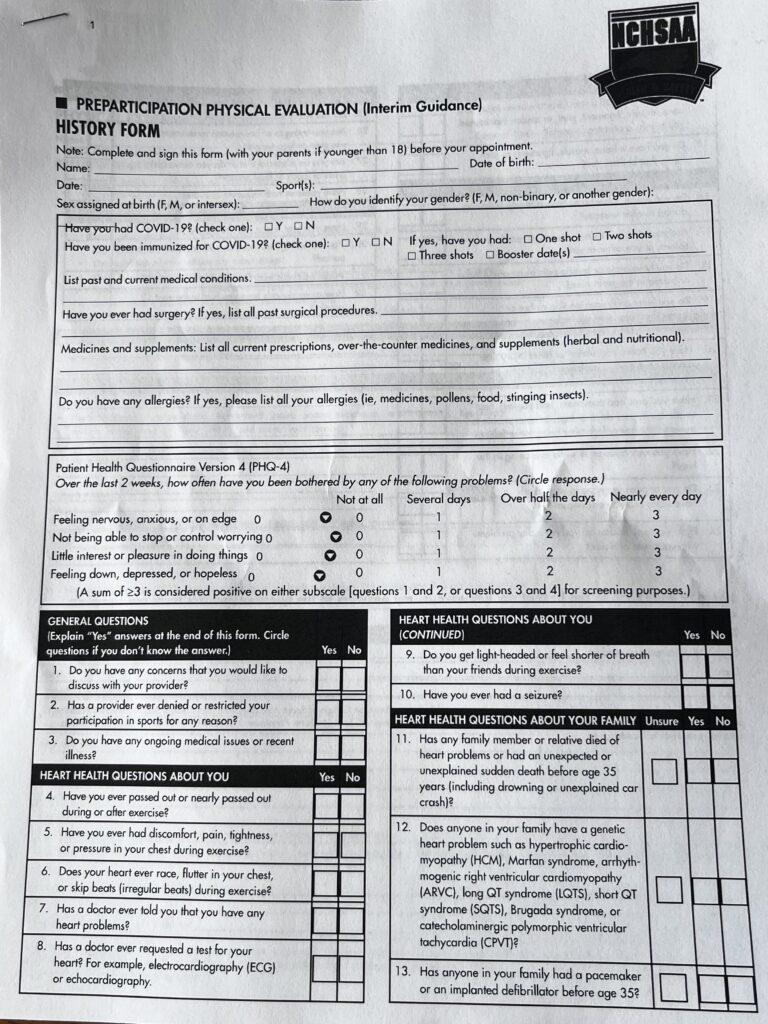 A student pulled out an electronic cigarette, commonly known as an “e-cig,” on the bus and took a long drag. He smiled as the water vapor blew out the window. Although the student knew his e-cig was banned on school property because of a recent addition to the Henderson County Student Code of Conduct, he felt like he should be allowed to use it because it not contain any tobacco.
A student pulled out an electronic cigarette, commonly known as an “e-cig,” on the bus and took a long drag. He smiled as the water vapor blew out the window. Although the student knew his e-cig was banned on school property because of a recent addition to the Henderson County Student Code of Conduct, he felt like he should be allowed to use it because it not contain any tobacco.
With the growing popularity of electronic cigarettes, many students are finding themselves in the same situation as the one we just described, and are they are confused when their e-cigs are confiscated. Although most schools across the country have tobacco-free campuses, many are finding that they have to implement an additions to tobacco policies to include the relatively new electronic cigarettes.
At the May meeting of the Henderson County School Board, members passed a change to the student code of conduct to address an epidemic of of electronic cigarette use on school campuses. The school board revised its “Use of Tobacco Products” policy to include e-cigs, thereby banning them from school campuses along with other tobacco products.
The state’s Smoke-Free Restaurant, Bar and Lodging Law passed in 2010 does not address the use of e-cigs in public places, but business owners do have the authority to prohibit the use of products within their businesses.
Electronic cigarettes heat liquid nicotine these or other substances to create water vapor without the tar of cigarettes. Research into the safety of e-cigs has lagged behind their popularity. The number of teenagers and chidden using them doubled between 2011 and 2012, according to WebMD.com.
West is one of the many schools learning how to deal with electronic cigarettes. Assistant Principal Shannon Auten said electronic cigarettes are treated the same way as traditional cigarettes on campus.
“We try to treat it the same as a cigarette,” Auten said. “It is not technically tobacco use, but if we’re giving a day of in-school suspension for cigarettes, we will do the same for an electronic cigarette.”
Principal Dean Jones recently announced that students would receive a one-day out-of-school suspension for possession of an e-cig or vaporizer on campus and a two-day out-of-school suspension for use on campus.
Freshman Kate Cashman agrees with the new Henderson County regulations and believes that electronic cigarettes have no place on school campuses or in school buildings.
“I think electronic cigarettes should be treated the same way (as cigarettes) because they are still cigarettes,” Cashman said. “I feel like electronic cigarettes are made more for adults that are trying to stop smoking, not just for kids to use just because they think they can.”
Senior Chandler Hampton has smoked electronic cigarettes, and he believes they should be allowed on school campuses.
“Smoking an electronic cigarette isn’t bothering anyone other than the person actually smoking it. Real cigarettes are gross and they smell,” Hampton said. “I don’t think they should be banned. I mean they don’t have all the bad products in them, like tobacco, just nicotine. It doesn’t smell and it keeps people from smoking real cigarettes.”
Karen Caldwell, the program consultant for the N.C. Department of Human Services, recognizes the dangers that electronic cigarettes pose to teenagers. Caldwell said the N. C. General Assembly passed a law regarding the sale of electronic cigarettes to minors in 2013, but they are not yet sure of the results it will have.
“In June 2013, the state legislature passed a law prohibiting the sale of electronic cigarettes to minors. This regulates vending machine sales, store sales and online sales as well,” Caldwell said. “This policy is still relatively new, so it’s hard to tell how effective it will be. Although from 2011 to 2012 youth use of electronic cigarettes doubled, most likely because they were not well regulated, and because of the appeal they have for teenagers. This is what we are trying to prevent with this new law. Our interpretation is that because state law prohibits tobacco use on campuses and the use of products derived from tobacco, this includes electronic cigarettes. Electronic cigarettes contain nicotine, a product which is derived from tobacco, and therefore should not be allowed on the campuses of middle and high schools.”
Caldwell said the Department of Human Services is concerned about the effect that electronic cigarettes might have on society.
“What we are most concerned about is the way that electronic cigarettes might re-normalize the idea of smoking,” Caldwell said. “Electronic cigarettes are marketed like traditional cigarettes were marketed 40 years ago, and because you’re allowed to smoke them in public places, it seems like electronic cigarettes could make smoking a social norm again.”
Electronic cigarettes appeal to younger consumers for a number of reasons. They’re portrayed as being less dangerous than traditional cigarettes, and they are made in a variety of flavors, including vanilla and cherry. Most middle school and high school students know the dangers posed by regular cigarettes, but they don’t realize that in 2009 lab tests conducted by the FDA, it was found that the two leading brands of electronic cigarettes contained detectable levels of carcinogens or cancer-causing agents.
Caldwell said the fun flavors of e-cigarettes definitely appeal to teenagers, but there is an even bigger draw.
“The thing about them that most appeals to teenagers is that they are portrayed as sexy and dangerous,” Caldwell said. “They are marketed with this sense of rebellion like, ‘You can smoke these in your house and your parents will never know’ or ‘You can smoke these at school and your teachers will never know.’”
Creative smokers are finding ways to use electronic cigarettes to smoke marijuana undetected. Cannabis, in the form of either liquid or wax, doesn’t give off the distinct odor of marijuana, so smokers can use the product in an e-cig virtually anywhere. According to the Daily Mail website, authorities are concerned about the prospect of minors using electronic cigarettes and then graduating to cannabis oil instead of the regular oils usually used.
According to Caldwell, one of the most dangerous things about electronic cigarettes is how little testing has been done on them and how little information is known.
“What makes them so dangerous is that we don’t really know all the true dangers yet. They are not FDA regulated at this point, but we do understand that they contain nicotine, a known poison, and some contain more nicotine than others,” Caldwell said. “Because there are not many clinical trials yet, the only ones doing quality control are the companies that make the electronic cigarettes, and that is why we can not completely understand all the dangers.”
By Polly Phillips and Olivia Slagle












